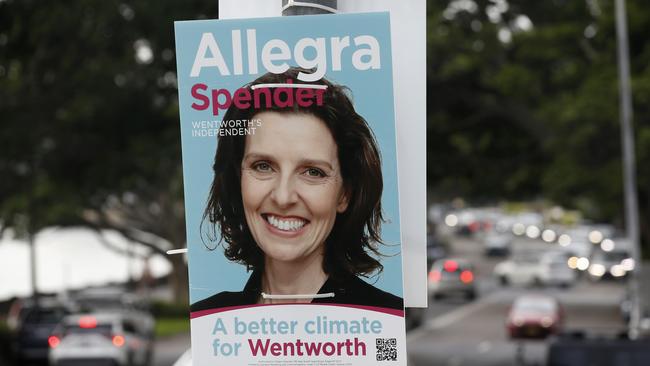
One woman spots some old gumboots. “Ah yes,” says Marcus, not hiding his contempt, “those are cheap gumboots that I painted flowers on so I could charge you 30 quid.” “For a pair?” asks the sweet hippie airhead. “Each,” he grunts, “or you can take three for a hundred.” “Oh, great,” she says, “I’ll take three.”
Getting around Wentworth, where women – and they are overwhelmingly women – in teal-coloured T-shirts are spruiking the policies of Allegra Spender, I can’t help thinking her backer, Simon Holmes a Court, bears a striking resemblance to the cynical Marcus.
When we talk about the teals, we should focus on Holmes a Court. He is the common thread holding them together, financially, politically and structurally. And, like Marcus, Holmes a Court sure saw his constituency coming: mostly women who have grown weary with the usual array of things on offer from the usual parties. They are excited to be part of something new – not quite Liberal, not quite Labor, not quite Green – something different.
It is possible that, like Marcus’s not very bright target demographic, the women who have become teal devotees in Liberal-held seats don’t realise they have become pawns to tear down a party that clearly Holmes a Court has turned his back on.

To be sure, Holmes a Court is not alone in losing faith in, and patience with, the Liberal Party’s current leadership. The Liberals cannot escape responsibility for the rise of the teals. Locking out Australians from this country for two years has damaged the party’s claim to be liberal. Morrison’s clumsy response to an alleged rape in parliament, relying on his wife to understand the gravity, damaged the party’s credibility on women. On numerous fronts, Morrison’s leadership has bolstered the rise of the teals.
The issue is how to deal with one’s disappointment with Morrison’s leadership. Holmes a Court’s response is clever. Like Marcus, he has spotted a market that is too rich and too easily manipulated for its own good. He has found policies whose appeal to affluent searchers for virtue is matched only by their vapidity and lack of rational analysis. You can have urgent climate action without significant cost; an integrity commission without defining corruption; and gender pay equity without grappling with the reality of women’s preferences.
But what is Holmes a Court trying to achieve and what effect will he have? It seems he wants to build a new political force. Maybe he is just today’s Don Chipp, seeking to keep the bastards honest. His plan, by funding teal candidates to knock off Liberal moderates, can only be to dismantle the broad church of the Liberal Party by stealing its centre for himself.
It will, if successful, at minimum alter the traditional mix of moderates and conservatives that John Howard lauded as the heart and soul of a successful broadbased political party but very possibly split the party in two.
And Holmes a Court has found, in Morrison, the perfect mechanism to trash the party. The problem is that this will dramatically weaken the Liberal Party in the short, and perhaps medium, term without creating a lasting viable third force.
Consider the stupidity of affluent teal fans patting themselves on the back for not voting Labor. And hell, no, never, those capitalist-hating Greens. Yet as single-issue candidates with no economic policies or credentials, teals in parliament will hand the economic levers to Labor and the Greens.
If Liberal moderates are turfed out, the Liberal Party will represent a narrower constituency of voters, making it a less competitive force. That will mean an emboldened alliance of Labor, Greens and teals. Economically, the country will lurch left by default, hurting the well-heeled interests of teal fans and doing little to improve opportunities for the less well-off.
Yes, teal voters might get more climate action more quickly. And then they will have to reckon, for the first time in their affluent lives, with the high price of their indulgence on the poor. They will get an open-ended national integrity commission without clear definitional limits and replete with public show trials. What they will get on gender issues is anyone’s guess because the teals (and others) haven’t decided whether they want equality of outcome or equality of opportunity.
In the meantime, the teal removal of high-profile and hardworking Liberal moderates such as Josh Frydenberg in Kooyong, Dave Sharma in Wentworth, Tim Wilson in Goldstein and Trent Zimmerman in North Sydney will dismantle the broad church and make the Liberal Party more conservative.
Stable government and reforms that last can come only from within centrist parties with full policy platforms, not from crossbenchers or single-issue candidates. Australia’s highly regulated, non-competitive economy was opened up by the Hawke government. The tax system was overhauled to introduce a broadbased consumption tax and remove inefficient state taxes by the Howard government.
Today’s example is the hard policy work by Wilson, fellow moderates such as Andrew Bragg and Jason Falinski, and conservative James Paterson, who drove Sunday’s release by the Prime Minister of a headline policy to allow young Australians to access part of their super to buy a house. This policy is vintage broad church, Menzian policy.
By and large, the teals are too rich to have to worry about housing affordability. That, in turn, explains why they are not a lasting political force. That said, there will always be a political version of Marcus on a power trip to entice “posh thickos” on their own power trip. And the country can ill afford the damage they could do in their search for tarted-up, overpriced gumboots.








There is a British spoof show that features a chap called Marcus, who runs a shop in Notting Hill called I Saw You Coming. Marcus has a sly, sanctimonious look about him as he sells what he calls a “bunch of crap” to women he calls “posh thickos”. His customers are often blonde, never very bright and invariably rich, with husbands who work in the City. They are happy to browse for overpriced old sofas and lamps that Marcus collects from boot sales and upscales with little more than a hefty price tag.